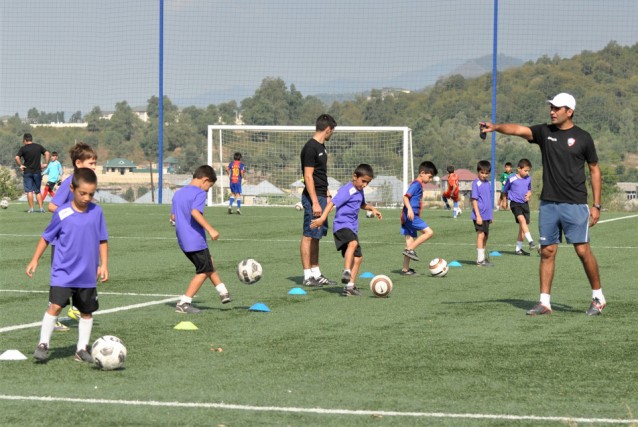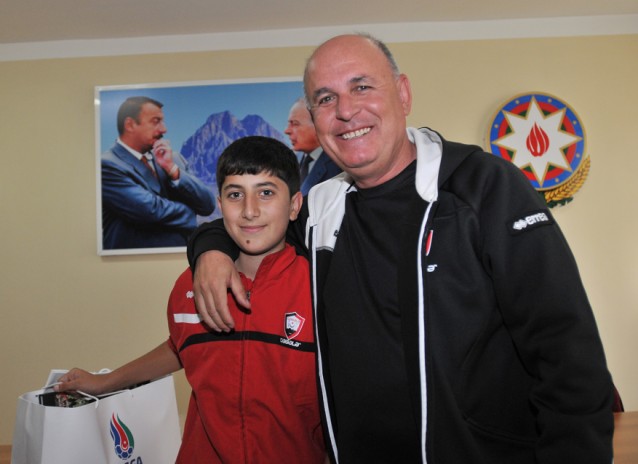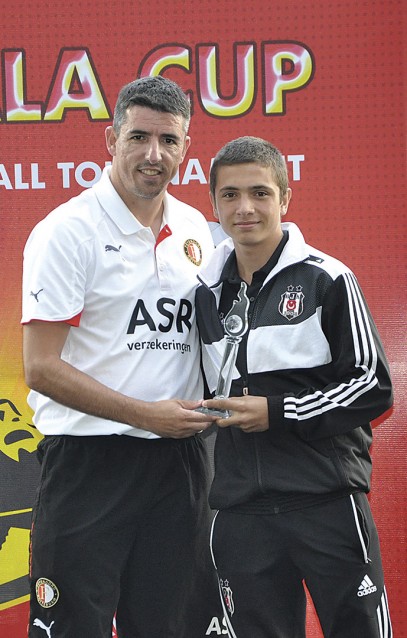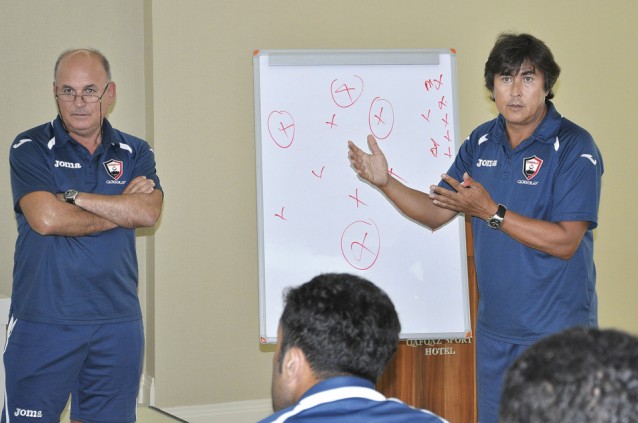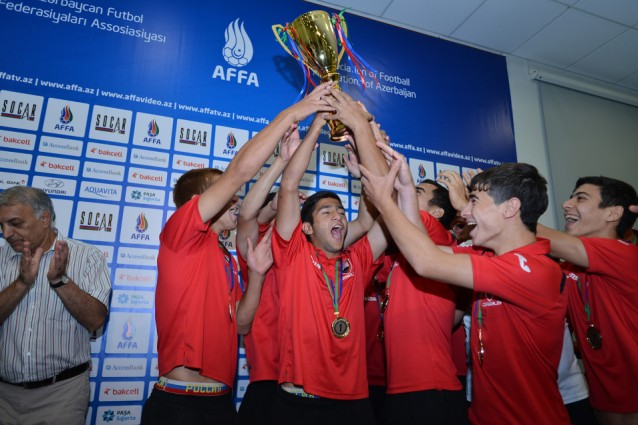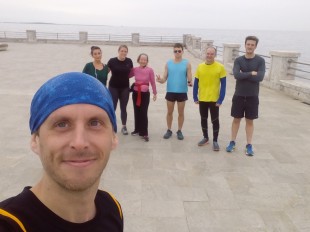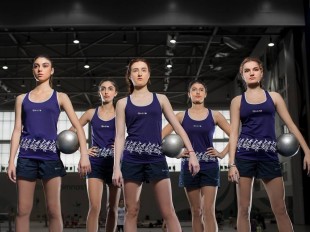The Qabala Football Academy, which was founded in 2009, is today the largest training centre for young footballers not just in Azerbaijan but in the entire Caucasus. Though much younger than similar institutions, its development has been rapid, as sports journalist Ilham Rafi explains...
THE EARLY DAYS
Back in 2006, two teams were created, for under 15s and under 17s. In those days, the national championships for these age groups were held over a short period of time; during a season, there were only 12-14 games. The main goal of the club’s creation has always been to develop youth football, as well as to prepare footballers for the Azerbaijani national and Qabala first teams, so the club’s first major project was to create the academy. Thus Qabala Football Academy was founded in Azerbaijan in 2009 at the initiative of club president Tale Heydarov.
However, back then it was difficult to establish an academy and develop youth football because there was neither the proper infrastructure nor the experts. Ali Yavash, a Turkish expert, was soon invited to Qabala where he began working with Halim Fichiji, now the head of the academy. These two experts had worked together at the Galatasaray academy from 2002-2008 and nurtured gifted Turkish players such as Arda Turan (Barcelona), Sabri Sarachoghlu (Goztepe), Emre Cholak (Deportivo La Coruna) and Semih Kaya (Sparta Prague). To study the experience of foreign clubs, club president Tale Heydarov and Ali Yavash went to Great Britain in October 2009 and met with representatives of Everton and Chelsea, learning about their stadiums and training facilities. Soon after the concept of the Qabala academy was developed: the main and auxiliary buildings were built, training grounds were fenced, dining and recreation rooms created and trials were held to select talented children.
About 40 of our footballers play in different Azerbaijani national teams in various age groups
Halim Fichiji, the academy’s director, recalls: We set our goals as soon as we arrived in Qabala. You can see the development in every sphere. We started working with 28 footballers and two teams and now we have about 250 footballers and 15 teams. Nine teams successfully compete in the Azerbaijani championship. Working with 18 coaches, we have the best training foundation in Azerbaijan. Seven graduates of the academy are first team players for Qabala, about 40 of our footballers play in different Azerbaijani national teams in various age groups. Whereas in the beginning we had only one artificial pitch, there are now eight full-sized training pitches – including six natural and two artificial ones – at the disposal of our footballers.
ROAD TO VICTORY STARTS IN QABALA
One of the main areas in which the academy has succeeded is the selection process. At first, it only coached local children but soon it began selecting more talented and promising children from further afield. As a result, four teams were created (U13, U14, U17 and U19) and they started playing matches organised by the Association of Football Federations of Azerbaijan (AFFA). Soon the academy’s U17 team won the Cup of Azerbaijan in the 2009-2010 season.
The academy organises open trials in Baku and Qabala every summer and winter in which some 1500-2000 children take part. These multi-stage trials are held under the motto Qələbəyə gedən yol “Qəbələ”dən başlayır (The road to qalaba (victory) starts in Qabala) and the most talented of these children are enrolled to train at the academy. A selection group at the academy was founded to increase the quality of the trials, headed by the well-known Azerbaijani former player and manager Boyukaga Hajiyev. The 25 experts that are members of the group watch the matches of the Azerbaijani football championships very carefully to spot talented children and report back to the academy. Qabala scouts work not only in Azerbaijan, but also in Russia and Ukraine and the club organises trips to Qabala for young footballers from these countries. Another of the club’s structures is the Football Popularisation Department which contributes greatly to the trials by implementing programmes in schools and creating a football environment (“training basis”) for children suitable for training at the academy. Hundreds of children previously coached through this department are now at the academy.
ROLE OF THE QABALA CUP
Qabala Football Academy attaches great importance to organising training camps and participating in international tournaments held abroad. Qabala teams travel widely to foreign countries, including to Great Britain, Holland, Germany, Spain, Portugal, Italy, Turkey, Russia, Moldova, Latvia and more.
One of the largest projects at Qabala Football Club that helps to maintain the focus on developing youth football is the Qabala Cup, which is the first international tournament to be held in Azerbaijan at U15 level. It was first held in May 2012 when Turkish side Galatasaray won the competition, which featured eight teams. So far, major European clubs such as Barcelona (Spain), Liverpool (Great Britain), Porto (Portugal), Feyenoord (Holland), Anderlecht (Belgium), Zenit (Russia), Brondby (Denmark), Shakhtyor (Ukraine), Udinese (Italy) and Fenerbahche (Turkey) have all taken part in the tournament. Tony Adams, the English football legend; Roy Makaay, one of the best forwards in the history of Dutch football; Julio Alberto Moreno, a well-known Spanish footballer; and Albert Pyuch, a renowned youth football specialist, have all been to Qabala and taken part in the tournament and Qabala’s young players have gained vast experience by meeting these famous figures from the world of football.
Roy Makaay: Having travelled a long way, we formed a good impression of Qabala. I can say only good things about the competition as well as the infrastructure at the club. It was a great experience for my team. The atmosphere at Qabala is better than at Feyenoord.
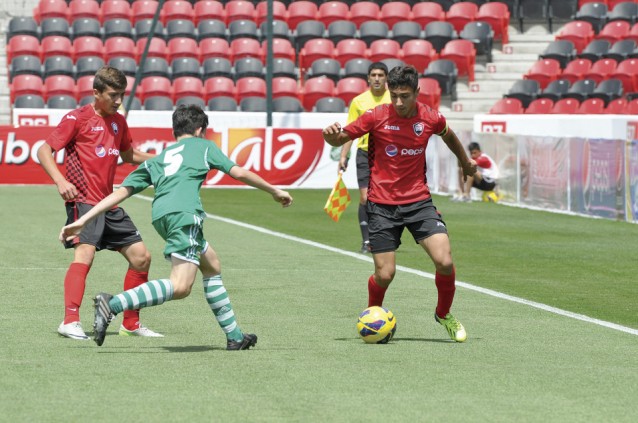 The Qabala U15 team’s former captain Farid Nabiyev attacks. Farid now plays for Slaviya U19s in Prague (Czech Republic)
The Qabala U15 team’s former captain Farid Nabiyev attacks. Farid now plays for Slaviya U19s in Prague (Czech Republic)
DUTCH SPECIALIST ARRIVES IN QABALA
The appointment in 2013 of internationally renowned youth coach Stanley Brard as director of Qabala Football Academy was the most significant event in the academy’s history. The Dutch expert first arrived in Qabala in the summer of 2002 at the Qabala Cup when he was then director of the Feyenoord Academy. Brard visited Azerbaijan for the second time in April 2013 and after Ali Yavash’s departure, he took over as director of the academy at Qabala.
The new director brought great experience. Following his career as a player at Feyenoord (where he played eight seasons), he became a coach at Capelle (1994) and Vitesse (1996-2000) followed by Den Hag (2001), clubs in his homeland. He was the head coach of Japanese football club Nagoya Grampus Eight for four years (2002-2005) and of Feyenoord Football Academy for seven years. Under his leadership, the Feyenoord academy won the Rinus Michels Award in 2010, 2011 and 2012. Having then served two years and five months at Qabala, in 2016 he returned to Japanese club Nagoya Grampus Eight as sports director. His work at Qabala, however, was a new stage in the development of the academy.
Stanley Brard: When we were in Qabala we had to accomplish several key tasks. One of them was to develop the professionalism of the coaches and players at the academy and increase their knowledge and skills. To that end, we made some changes to the training programme. We also made little changes to the organisation and content of the training sessions. We did some work to increase the theoretical and practical knowledge of the coaches.
In regular seminars, I managed to pass on my theoretical knowledge to the young coaches. These innovations had a positive impact on our style of play and I am very pleased that our coaches welcomed them and did their best to implement our ideas. I hope that these principles will be respected at the academy after my departure.
PROFESSIONAL TEAMS
At the Qabala academy, players of age groups ranging from eight to 17 are developed under the leadership of professional coaches. The main criteria for being admitted to the academy is having the desire to play for the Qabala first team; once this has been put to the test, the young player earns the right to train there. At the academy, there are yearly, monthly, weekly and even daily training programmes for each age group. Having successfully progressed through the years, footballers are finally sent to the professional club. Children who join the academy at eight continue to train there until being admitted to the professional club. During this period they are instilled with what it means to play for Qabala.
The Qabala academy also attaches great importance to increasing the knowledge and skills of its coaches and administrative staff. Coaches regularly join UEFA qualification courses and develop their theoretical and practical knowledge. Sanan Gurbanov and Ramin Guliyev, assistants to the head coach of the first team, the Ukrainian Roman Grigorchuk, both started their careers at the academy. The coaches of the U19 (Emin Imamaliyev) and U17 (Yashar Abuzarov) teams have played for the Azerbaijani national team and these footballers gladly share their experiences with the younger ones.
Emin Imamaliyev: There is a very good team of staff at the academy. Qabala Football Academy has the type of atmosphere whereby both the coaches and young footballers can develop as they want here.
KEY TO SUCCESS
Qabala Football Academy is one of the leading institutions contributing to the development of Azerbaijani football, striking examples of which are the successes of the academy teams. The dominance of Qabala academy teams has become a common feature of the Azerbaijani national championships, as the academy teams usually win the championships each season in the different age groups or, in the worst case scenario, take silver or bronze medals. The academy set a record in the 2015-2016 season: all of its nine teams, playing in different Azerbaijani leagues, finished in the top three of their leagues and the U19 team qualified to compete in the UEFA Youth League.
more than 30 graduates of the Qabala Football Academy, founded eight years ago, now play professional football
Currently five academy graduates – Elvin Jamalov, Roman Huseynov, Tellur Mutallimov, Murad Musayev and Gismet Aliyev – are at the disposal of Roman Grigorchuk, head coach of the first team. All of these players have experienced the excitement of playing in the Topaz Premier League. Among them, Tellur should be given a special mention. This talented young footballer played for Qabala in the first qualifying round of the Europa League last season and was also called up to the Azerbaijani national team. Three graduates from the academy are in the Azerbaijan U23 squad and seven are in the U21s. Some academy graduates – Ehtiram Shahverdiyev, Bahlul Mustafazade, Yusif Nabiyev and Amil Yunanov (Sumgayit), Sadiq Guliyev (Zira), Kamal Mirzayev and Shirmahammad Mammadov (AZAL), Tarzin Jahangirov (Neftchi) – currently play in the Azerbaijani Topaz Premier League. Another 13 feature in the development teams of different clubs. In short, more than 30 graduates of the Qabala Football Academy, founded eight years ago, now play professional football, which shows that Qabala Football Academy is a genuine football development centre. Thanks to its footballing traditions, Qabala is now at the same level as other Azerbaijani towns and cities such as Ganja, Tovuz, Sumgayit and Mingachevir.
The club looks to the academy’s future with great expectations. Meanwhile we hope that Qabala Football Academy will become one of the leading academies in Eastern Europe and the wider world.
About the author: Ilham Rafi has been working in journalism since 1996. He worked as a sports reporter for the newspapers “Bizim Esr” (Our Century), “Aina-Zerkalo” (The Mirror) and “Paritet” newspapers and for the “Sportsman” magazine. From 2011 until 2016 he served as deputy editor of Qabala IK newspaper, the official publication of Qabala Football Club.
